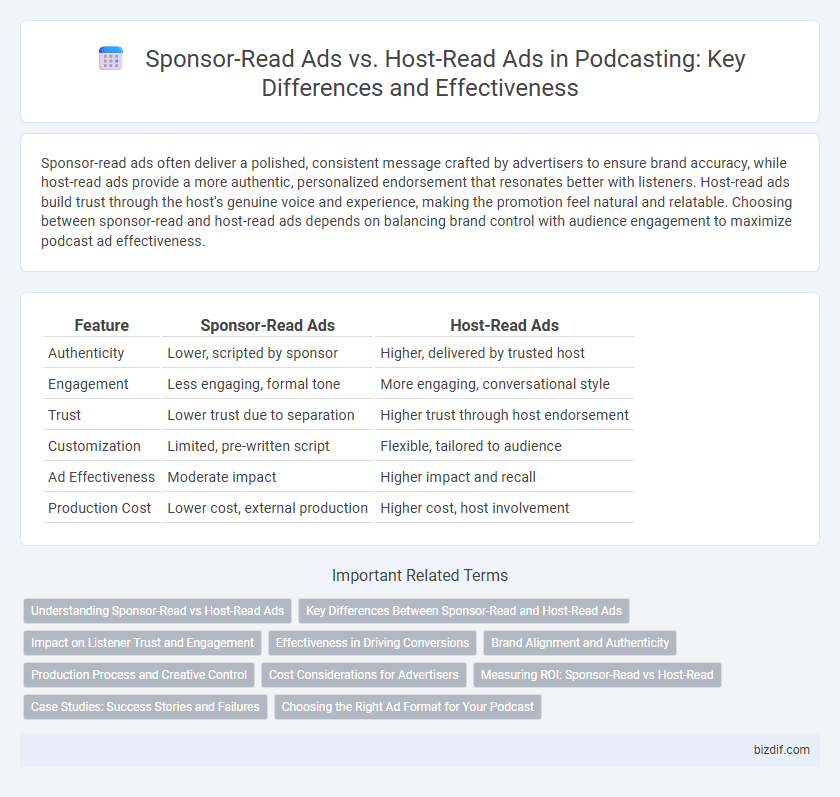Sponsor-read ads often deliver a polished, consistent message crafted by advertisers to ensure brand accuracy, while host-read ads provide a more authentic, personalized endorsement that resonates better with listeners. Host-read ads build trust through the host's genuine voice and experience, making the promotion feel natural and relatable. Choosing between sponsor-read and host-read ads depends on balancing brand control with audience engagement to maximize podcast ad effectiveness.
Table of Comparison
| Feature | Sponsor-Read Ads | Host-Read Ads |
|---|---|---|
| Authenticity | Lower, scripted by sponsor | Higher, delivered by trusted host |
| Engagement | Less engaging, formal tone | More engaging, conversational style |
| Trust | Lower trust due to separation | Higher trust through host endorsement |
| Customization | Limited, pre-written script | Flexible, tailored to audience |
| Ad Effectiveness | Moderate impact | Higher impact and recall |
| Production Cost | Lower cost, external production | Higher cost, host involvement |
Understanding Sponsor-Read vs Host-Read Ads
Sponsor-read ads deliver a pre-produced message directly from the sponsor, ensuring consistent branding and scripted content across episodes. Host-read ads offer a personalized endorsement by the podcast host, often increasing listener trust and engagement through authentic delivery. Understanding the distinctions helps podcasters choose the right format to maximize ad effectiveness and audience connection.
Key Differences Between Sponsor-Read and Host-Read Ads
Sponsor-read ads in podcasting typically feature pre-recorded scripts delivered by professional voice actors or the sponsor themselves, ensuring consistent messaging but often feeling less personal. Host-read ads are delivered organically by the podcast host, leveraging their trust and rapport with the audience to create a more authentic and engaging promotion. The key difference lies in the level of personalization and audience connection, with host-read ads generally driving higher listener engagement and conversion rates.
Impact on Listener Trust and Engagement
Host-read ads significantly boost listener trust and engagement by leveraging the established relationship between the host and audience, creating a sense of authenticity and personal endorsement. Sponsor-read ads often lack this personal touch, leading to lower engagement rates as listeners may perceive them as less genuine or intrusive. Studies show that host-read ads increase brand recall by up to 63%, highlighting their effectiveness in maintaining listener loyalty and driving action.
Effectiveness in Driving Conversions
Host-read ads deliver higher engagement and trust by leveraging the podcast host's authentic voice, resulting in significantly greater conversion rates compared to sponsor-read ads. Studies indicate that host-read ads can increase listener response by up to 3 times due to personalized endorsements and seamless integration. Sponsor-read ads often lack this connection, making them less effective in driving immediate listener actions and brand loyalty.
Brand Alignment and Authenticity
Host-read ads deliver higher brand alignment and authenticity by leveraging the podcast host's trusted voice, creating a natural and seamless endorsement that resonates with the audience. Sponsor-read ads, while consistent and scalable, often lack the personalized touch that strengthens listener trust and connection to the brand. Authentic integration of sponsor messages in host-read formats enhances engagement and improves overall ad effectiveness in podcast marketing.
Production Process and Creative Control
Sponsor-read ads are typically pre-produced by advertisers, allowing less flexibility in tailoring the message to the podcast's unique style or audience, resulting in a more standardized production process. Host-read ads offer greater creative control, enabling the host to integrate the advertisement naturally with personalized tone and context, which often enhances listener engagement and authenticity. This approach requires more time and effort during recording but leverages the host's credibility to effectively convey the sponsor's message.
Cost Considerations for Advertisers
Sponsor-read ads typically involve pre-produced content, lowering costs through streamlined production and easier scalability across multiple episodes. Host-read ads demand more time and effort, often leading to higher fees due to personalized delivery and stronger listener trust, which can enhance ad effectiveness. Advertisers balance budget constraints with potential ROI when choosing between the standardized, cost-efficient sponsor-read ads and the higher-cost, high-engagement host-read ads.
Measuring ROI: Sponsor-Read vs Host-Read
Sponsor-read ads provide standardized messaging that enables easier tracking and consistent metrics, facilitating straightforward ROI measurement through click-through rates and coupon codes. Host-read ads generate higher listener engagement and trust, often resulting in increased conversion rates and deeper audience connection, making ROI evaluation reliant on nuanced listener response metrics and brand affinity. Comparing ROI requires balancing quantitative data from sponsor-read campaigns with qualitative insights driven by host-read ad authenticity.
Case Studies: Success Stories and Failures
Sponsor-read ads often falter due to mismatch in tone or lack of authenticity, as seen in the failed campaign of Blue Apron's generic ad read on Joe Rogan's podcast. Host-read ads, exemplified by Mailchimp's partnership with "My Favorite Murder," generate higher listener trust and engagement, resulting in a 30% uplift in conversion rates according to a Nielsen study. Case studies reveal that host-read ads yield better ROI and brand recall by leveraging the host's credibility and personal connection with the audience.
Choosing the Right Ad Format for Your Podcast
Sponsor-read ads often provide consistency and ease of production, making them ideal for podcasts with tight schedules or those seeking standardized messaging. Host-read ads deliver higher engagement and authenticity, as listeners trust the host's personal endorsement, which can lead to better conversion rates. Evaluating your audience's preferences, podcast style, and advertiser goals helps determine the optimal ad format to maximize revenue and listener retention.
Sponsor-read ads vs Host-read ads Infographic

 bizdif.com
bizdif.com